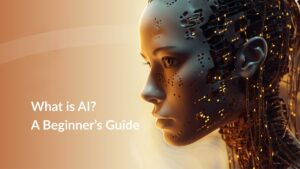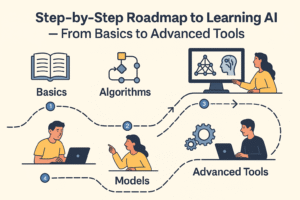
Artificial intelligence (AI) is no longer just tech jargon—it’s a powerful tool transforming how students learn, research, and create. Whether you’re preparing for exams, working on a thesis, or crafting a creative project, AI can make your journey easier and more effective.
This article explains how AI helps students from different backgrounds study smarter, accelerate research, spark creativity, and even innovate as entrepreneurs. Plus, educators get tips on guiding students toward responsible AI use.
What Is AI and Why Should Students Care?
AI involves machines or software performing tasks that usually require human intelligence—like understanding language, recognizing patterns, or making decisions.
For students, AI acts like a personalized assistant. It helps manage study schedules, summarizes complex topics, provides practice quizzes, and supports creative thinking. Using AI wisely means getting more done in less time, with better results.
How AI Helps Students Study Smarter
AI-powered study tools are designed to adapt to your unique learning style and needs.
- Personalized Study Plans: AI analyzes your progress and suggests focused study schedules, cutting down wasted time.
- Smart Note-Taking and Summaries: Apps like Notion AI or Otter.ai turn lectures and textbooks into easy-to-digest notes.
- Adaptive Flashcards and Quizzes: Tools such as Anki use spaced repetition to help information stick longer.
- Writing Assistance: Grammarly and similar AI writing aids improve grammar, clarity, and style for essays and assignments.
Recommended Study Tools
- Quizlet: AI-enhanced flashcards and testing.
- Grammarly: Real-time writing feedback.
- Microsoft OneNote AI: Organizes notes efficiently.
- Socratic by Google: Homework help using AI.
AI in Academic Research and Thesis Work
Research can be overwhelming. AI simplifies it by:
- Literature Review Automation: Tools like Iris.ai quickly find relevant research papers, helping you cover more ground.
- Data Analysis: AI software identifies trends and insights from large data sets.
- Citation Management: Zotero and Mendeley automatically format references and organize sources.
- Project Management: AI helps you plan timelines, track progress, and stay on schedule.
Useful Research Tools
- EndNote: Citation management with AI features.
- Semantic Scholar: AI-driven research search engine.
- Ref-N-Write: Academic writing assistant with AI.
Preparing for Competitive Exams Using AI
For exams like UPSC, CAT, NEET, and JEE, AI can be a game changer:
- Mock Tests with AI Analytics: Platforms such as Gradeup and Testbook offer practice tests tailored to your strengths and weaknesses.
- Personalized Revision: AI highlights topics needing more focus, so you study smarter.
- 24/7 AI Tutors: Many apps provide instant answers and explanations whenever you need.
AI for Creative and Design Students
Creativity meets technology with AI tools that:
- Generate Ideas: AI like ChatGPT helps brainstorm storylines, slogans, and creative content.
- Design Assistance: Canva’s Magic Write and AI art generators like DALL·E create visuals quickly.
- Enhance Workflow: AI acts as a creative partner, freeing you from repetitive tasks.
Student Entrepreneurs and AI: Innovate Faster
Young innovators benefit from AI by:
- Idea Generation: AI assists in brainstorming startup concepts and writing business plans.
- Market Insights: Analyze trends and customer data for smarter decisions.
- Rapid Prototyping: AI tools help build apps or products with minimal coding.
Educators and Mentors: Guiding Students on AI Use
Teachers can make AI an asset by:
- Recommending trusted AI tools based on student needs.
- Teaching ethical use, data privacy, and encouraging critical thinking alongside AI use.
Challenges and Considerations
While AI offers huge benefits, be mindful of:
- Privacy: Protect your data and understand how AI platforms use it.
- Bias: AI systems may reflect biases—use multiple sources and your judgment.
- Dependency: Use AI to assist, not replace, your own learning and thinking.
Conclusion: Making AI Your Learning Ally
AI is more than technology—it’s a learning partner helping students study efficiently, conduct research smartly, create boldly, and innovate rapidly. Embracing AI with care and awareness can boost your academic and creative journey, no matter your field.
FAQs
What are the best AI tools for students?
Popular ones include Quizlet, Grammarly, Notion AI, Socratic, and citation managers like Zotero.
Can AI help with exam preparation?
Yes, AI offers personalized mock tests and helps identify areas to focus on.
How does AI assist academic research?
It automates literature reviews, data analysis, citation formatting, and project management.
Is AI safe and ethical for students?
When used responsibly with awareness of privacy and plagiarism risks, AI is safe and ethical.
How can creative students benefit from AI?
AI helps generate ideas, creates content, and speeds up design tasks.
Also Read: How AI Is Transforming Corporate Workflows in India


